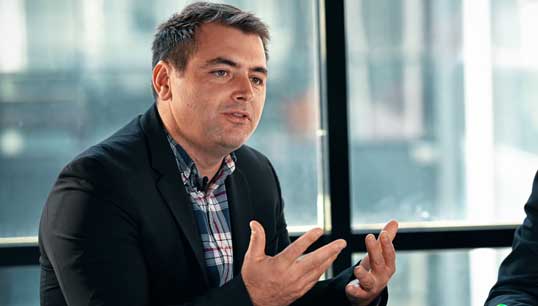- Topics
- Campaigning
- Careers
- Colleges
- Community
- Education and training
- Environment
- Equality
- Federation
- General secretary message
- Government
- Health and safety
- History
- Industrial
- International
- Law
- Members at work
- Nautilus news
- Nautilus partnerships
- Netherlands
- Open days
- Opinion
- Organising
- Podcasts from Nautilus
- Sponsored content
- Switzerland
- Technology
- Ukraine
- United Kingdom
- Welfare

Concerns were voiced in the first two Seafarers Happiness Index reports for 2022 about ever-increasing workloads and masters becoming office workers. In too many cases, digital solutions that should ease the reporting burden seem to instead increase it. What has gone wrong? Arnaud Dianoux, a former captain who has co-founded and is now managing director of French maritime data analytics company Opsealog, argues that better strategic planning will be key to reversing the trend.
The burden of data collection on board is swelling, as more stakeholders are demanding access to vessel data from a growing number of sensors. It has reached the point where some crews are spending so much time on data reporting that their other responsibilities are being impacted. The additional workload is leading to fatigue and low morale, which increases the risk of mistakes and can ultimately impact safety on board.
Obviously, new technologies can help ease the task of collecting and reporting data. Why then are digital projects failing to deliver on this objective?
'The reality is that digital tools are only one part of the solution,' said Mr Dianoux. 'New technologies can help reduce the time spent by crew members inputting data onboard, but if stakeholders fail to agree on which data should be collected and assessed, new reports will keep being created and existing ones will not disappear.'
Stakeholders need to reach a consensus on what data is needed and which key performance indicators (KPIs) should be used, rather than just insisting that data is collected to support their own KPIs in isolation from others.
Project planning should include an analysis of data redundancy. To have a homogeneous reporting framework that will work across different departments in an organization, stakeholders also need to agree on a common vocabulary and set of definitions.
'Crucially, what's commonly missing is true dialogue about the realities at sea, Mr Dianoux commented. 'Captains and crew should be front and centre. The importance of their personal experience cannot be overstated. Organisations need to listen and make sure that digitalisation helps not only make work more efficient, but also improves seafarer welfare and quality of life on board.'
Beyond this, Mr Dianoux believes opportunities are easily lost without strategic thinking. He cites the example of reports produced by vessel monitoring systems that are being fed into a database and then largely forgotten.
'This data could be used to improve safety and efficiency. Analysis of multiple events of a similar nature can reveal recurring issues or operational trends. Once those trends are identified, action can be taken to manage them. In the longer term, data-driven insights may highlight the need for changes to onboard safety culture or structural changes on newbuilds.'
Tags
